
Richard Georg Strauss was a German composer and conductor best known for his tone poems and operas. Considered a leading composer of the late Romantic and early modern eras, he has been described as a successor of Richard Wagner and Franz Liszt. Along with Gustav Mahler, he represents the late flowering of German Romanticism, in which pioneering subtleties of orchestration are combined with an advanced harmonic style.

Der Rosenkavalier, Op. 59, is a comic opera in three acts by Richard Strauss to an original German libretto by Hugo von Hofmannsthal. It is loosely adapted from Louvet de Couvrai's novel Les amours du chevalier de Faublas and Molière's comedy Monsieur de Pourceaugnac. It was first performed at the Königliches Opernhaus in Dresden on 26 January 1911 under the direction of Max Reinhardt, with Ernst von Schuch conducting. Until the premiere, the working title was Ochs auf Lerchenau.
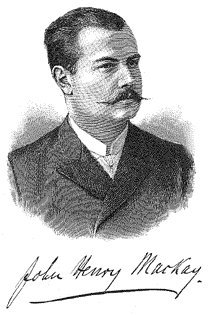
John Henry Mackay was a Scottish-German egoist anarchist, thinker and writer. Born in Scotland and raised in Germany, Mackay was the author of Die Anarchisten and Der Freiheitsucher.
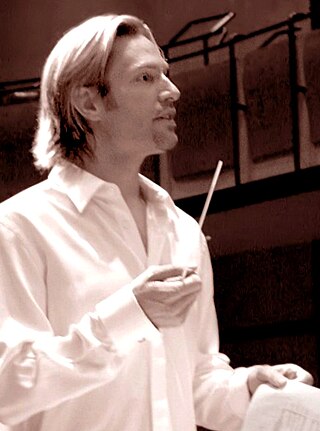
Eric Edward Whitacre is a Grammy-winning American composer, conductor, and speaker best known for his choral music.
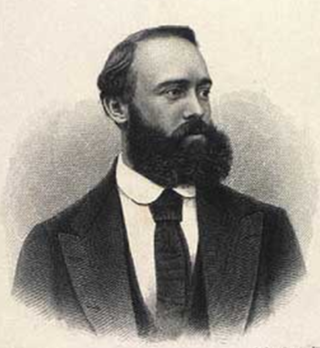
Eduard Lassen was a Belgian-Danish composer and conductor. Although of Danish birth, he spent most of his career working as the music director at the court in Weimar. A moderately prolific composer, Lassen produced music in a variety of genres including operas, symphonic works, piano works, lieder, and choral works among others. His most successful pieces were his fine vocal art songs for solo voice and piano which often used elements of German and Belgian folk music.

Metamorphosen, study for 23 solo strings is a composition by Richard Strauss for ten violins, five violas, five cellos, and three double basses, typically lasting 25 to 30 minutes. It was composed during the closing months of the Second World War, from August 1944 to March 1945. The piece was commissioned by Paul Sacher, the founder and director of the Basler Kammerorchester and Collegium Musicum Zürich, to whom Strauss dedicated it. It was first performed on 25 January 1946 by Sacher and the Collegium Musicum Zürich, with Strauss conducting the final rehearsal.
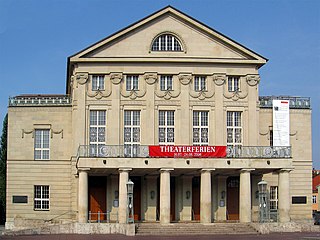
The Deutsche Nationaltheater und Staatskapelle Weimar (DNT), or German National Theater and Weimar State Orchestra, is the most significant arts organization in Weimar. The institution unites the Deutsches Nationaltheater with the Staatskapelle Weimar. It plays on a total of six stages across the city. All sections of the theater and orchestra periodically give additional guest performances and appear in electronic media.

Karl Friedrich Henckell was a German author, poet, and publisher.

Franz Liszt composed his Prometheus in 1850, numbering it No. 5 in his cycle of symphonic poems when he revised it in 1855. The work is based on the Greek myth detailing the Titan Prometheus' theft of fire from the gods and is numbered S.99 in the Searle catalogue.

The Allgemeiner Deutscher Musikverein was a German musical association founded in 1861 by Franz Liszt and Franz Brendel, to embody the musical ideals of the New German School of music.

The Symphony No. 2 in F minor was written by Richard Strauss between 1883 and 1884. It is sometimes referred to as just Symphony in F minor. He gave it the Opus number 12, and it also appears in other catalogues as TrV 126 and Hanstein A.I.2. It is not listed in von Asow's catalog.
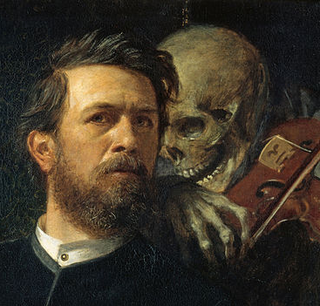
"Notturno", Opus 44, Number 1, is an orchestral song written for low voice, which Richard Strauss composed in 1899 based on a poem Erscheinung by the German poet Richard Dehmel (1863-1920). In performance it takes about 13 minutes. Norman Del Mar described it as “ranking amongst Strauss’s finest as well as more ambitious works”.

Wanderer's Storm Song, Op. 14, TrV 131, is a choral work for choir and orchestra written by Richard Strauss in 1884, based on a poem by Johann Wolfgang von Goethe of the same title.

"Befreit" is an art song for voice and piano composed by Richard Strauss in 1898, setting a poem by the German poet Richard Dehmel. The song is part of the collection Fünf Lieder für hohe Singstimme mit Pianofortebegleitung. Strauss orchestrated the song in 1933.

"Der Arbeitsmann" is an art song for voice and piano composed by Richard Strauss in 1889, setting a poem by the German poet Richard Dehmel. The song is part of the collection Fünf Lieder für hohe Singstimme mit Pianofortebegleitung. Strauss orchestrated the song in 1918.

"Ständchen" ("Serenade") is an art song composed by Richard Strauss in 1886, setting a poem of the same title by the German poet Adolf Friedrich von Schack. It is the second song in his collection Six songs for high voice and piano, Op. 17, TrV 149, which were all settings of Schack poems. The song is written for voice and piano.

Die Tageszeiten is a choral composition written for male voice choir and orchestra by Richard Strauss (1864–1949), TrV 256, Op. 76. It consists of four movements: "The Morning", "Afternoon Peace", "The Evening" and "The Night". The lyrics are based on four poems of the same names by Joseph Eichendorff (1788–1857) from his collection Wanderlieder. The work was premiered on 21 July 1928 with the Wiener Schubertbund and the Vienna Philharmonic as part of the Schubert centenary.

Taillefer, Op. 52, TrV 207, is a cantata for choir and orchestra composed by Richard Strauss in 1903. The text is a rendering of the medieval tale Taillefer by the German poet Ludwig Uhland (1787–1862). The piece was written to celebrate the centenary of Heidelberg University and was premiered on the same day that Strauss received his honorary doctorate from the university, on 26 October 1903 in the newly built Heidelberg Town Hall with Strauss conducting. It is written for a mixed chorus with three soloists, tenor (Taillefer), baritone, and soprano, with a large orchestra. The work was performed at the last night of The Proms in 2014.

Richard Strauss composed his Symphony No. 1 in D minor in 1880 when he was just 16 years old. It consists of four movements, and lasts about 34 minutes. Although Strauss did not give a number to the symphony, it is often referred to as his First Symphony. It was premiered on 30 March 1881 at the Munich Academy of Music under the baton of Hermann Levi.

Richard Strauss composed his Cello Sonata in F major, Op. 6, TrV 115, in 1883 when he was 19 years old. It was dedicated to the Czech cellist Hanuš Wihan, who gave the premiere in 1883. It rapidly became a standard part of the cello repertoire.




















